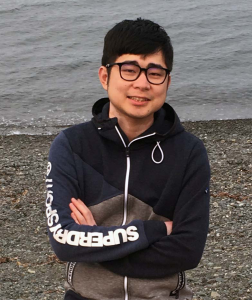Presented By: Michigan Institute for Computational Discovery and Engineering
Bo Zhu: Super-Resolution Structural Simulation and Optimization
MICDE Seminar Series

Abstract: Complex physical systems exhibiting mixed-dimensional geometry and multi-scale mechanics are ubiquitous. Examples include biological structures, such as insect wing exoskeletons, fluid phenomena, such as bubbles and jets, and human-made objects, such as microrobots. The beauty and complexity of these systems attract efforts from scientists, engineers, and artists in various fields. However, a computational investigation of these systems on the level of super-resolution –with millions to billions of computational elements — is still challenging, due to the non-manifold geometric structures, non-linear governing physics, and the tight coupling between them.
My work tackles these challenges by rethinking of the computation pipeline—from a perspective that aims to blur the line between discrete geometry and continuous physics. My guiding principle is to study the hidden low-dimensional topological and structural characteristics underpinning these complex systems and to create the most natural geometric analogs in a discrete setting for efficient simulation and optimization. In this talk, I will present two examples to demonstrate this methodology, including a super-resolution topology optimization algorithm based on sparse grids to emerge biomimetic structures and a numerical simulation approach based on simplicial complexes to model codimensional fluids. These computational tools enable the investigation, discovery, and development of a broad range of complex physical systems that are multi-scale and mixed-dimensional, with applications in computer graphics, computational physics, and additive manufacturing.
Bio: Bo Zhu is an assistant professor of Computer Science at Dartmouth College. Prior to that, he was a postdoctoral associate at MIT CSAIL. He received his Ph.D. in Computer Science from Stanford University in 2015.
My work tackles these challenges by rethinking of the computation pipeline—from a perspective that aims to blur the line between discrete geometry and continuous physics. My guiding principle is to study the hidden low-dimensional topological and structural characteristics underpinning these complex systems and to create the most natural geometric analogs in a discrete setting for efficient simulation and optimization. In this talk, I will present two examples to demonstrate this methodology, including a super-resolution topology optimization algorithm based on sparse grids to emerge biomimetic structures and a numerical simulation approach based on simplicial complexes to model codimensional fluids. These computational tools enable the investigation, discovery, and development of a broad range of complex physical systems that are multi-scale and mixed-dimensional, with applications in computer graphics, computational physics, and additive manufacturing.
Bio: Bo Zhu is an assistant professor of Computer Science at Dartmouth College. Prior to that, he was a postdoctoral associate at MIT CSAIL. He received his Ph.D. in Computer Science from Stanford University in 2015.